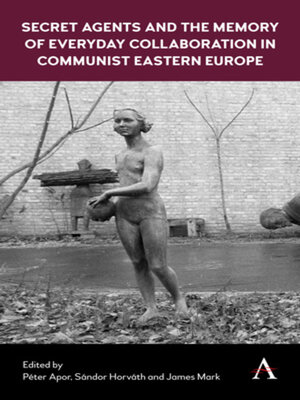Secret Agents and the Memory of Everyday Collaboration in Communist Eastern Europe
ebook ∣ Anthem Series on Russian, East European and Eurasian Studies
By Péter Apor

Sign up to save your library
With an OverDrive account, you can save your favorite libraries for at-a-glance information about availability. Find out more about OverDrive accounts.
Find this title in Libby, the library reading app by OverDrive.



Search for a digital library with this title
Title found at these libraries:
| Loading... |
Whilst debates over secret agents and the public revelation of lists of former collaborators have fascinated both post-Communist societies and the wider world, it is surprising how little has been written either on the nature of Communist-era collaboration or the processes through which post-Communist societies have sought to make sense of what collaboration was, and how it should be dealt with in the present. This is surprising given the amount of work that has been produced on the themes of resistance and victimization.
Unlike more popular (and often lurid) accounts of collaboration, which naturalise the concept as an obvious and incontestable characterization of Communist-era behaviour, 'Secret Agents and the Memory of Everyday Collaboration in Communist Eastern Europe' rather interrogates the ways in which Post-Socialist cultures produce the idea of, and knowledge about, 'collaborators'. It addresses those institutions which produce the concept and examines the function, social representation and history of secret police archives and institutes of national memory that create these histories of collaboration. This work seeks to provide a more nuanced historical conception of 'collaboration', expanding the concept towards broader frameworks of cooperation and political participation in order to facilitate a better understanding of the maintenance of Eastern European Communist regimes.
This work contends that secret police files are too often used to provide a one dimensional historical account of the 'mechanisms of oppression'. It demonstrates, through case studies, how secret police files can be used to produce more subtle social and cultural histories of the socialist dictatorships. Of particular importance is the focus on the microhistorical. Contributions here explore the motivations and moralities of becoming an agent, the personal decisions and social consequences such steps involved as well as the everyday milieus in which agents lived and were active. This book analyses communities of cooperation, with particular focus on local and mid-level party organizations, organs of the church organs and artist or intellectual networks. Ranging across differing categories of collaborators and different social milieux across East-Central Europe, this work provides a comparative account of collaboration and participation with a range hitherto unavailable.
|The collection of essays in Secret Agents and the Memory of Everyday Collaboration in Communist Eastern Europe addresses institutions that develop the concept of collaboration, and examines the function, social representation and history of secret police archives and institutes of national memory that create these histories of collaboration. The essays provide a comparative account of collaboration/participation across differing categories of collaborators and different social milieux throughout East-Central Europe. They also demonstrate how secret police files can be used to produce more subtle social and cultural histories of the socialist dictatorships. By interrogating the ways in which post-socialist cultures produce the idea of, and knowledge about, "collaborators," the contributing authors provide a nuanced historical conception of "collaboration," expanding the concept toward broader frameworks of cooperation and political participation to facilitate a better understanding of Eastern European communist regimes.






